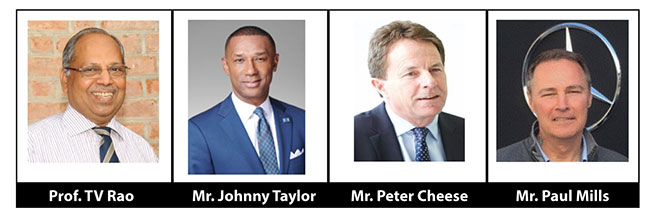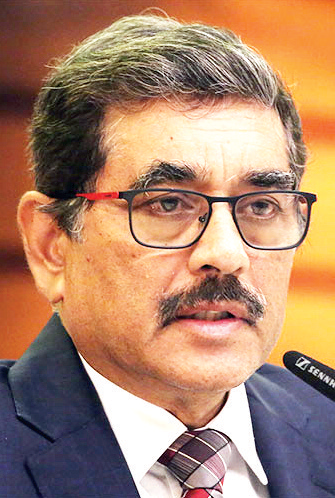Business
53 international, 11 Local speakers share insights at CIPM world HR congress 2021

CIPM Sri Lanka – the Nation’s leader in human resource management announced a line-up of 53 international and 11 local speakers including Chairpersons, CEOs, and General Managers of top Sri Lankan blue-chip companies together with leading academics in Sri Lanka who will share their knowledge and insights at the World HR Congress 2021. The World HR Congress will be held in virtual mode from December 6 to 8 on the theme “Exalting People Professionals Amidst a Planetary Pandemic: Explore, Expand and Excel”. These 64 speakers will participate in 4 plenary sessions, 4 panel discussions, and 4 rounds of concurrent technical sessions covering a wide range of topics that will deliberate the risks, challenges, and opportunities in the new world of work following the global pandemic.
“We are delighted that some of the world’s renowned international speakers, and top corporate experts and academics from Sri Lanka have accepted our invitation to share their knowledge, expertise, and firsthand experiences. The strategies in managing and motivating their respective workforces to achieve and exceed business goals in the pandemic-hit world of work would no doubt add tremendous value to the HR and business leaders at the conclave in terms of shaping their own people and business strategies” said Dhammika Fernando-Chairman, World HR Congress 2021 and Immediate Past President-CIPM Sri Lanka, President- Asia Pacific Federation of Human Resource Management, Board Director-WFPMA.
Johnny C. Taylor Jr – President and Chief Executive Officer, Society for Human Resource Management (SHRM) leads the list of international speakers at the conclave. With over 300,000 members in 165 countries, SHRM is the largest HR professional association in the world, impacting the lives of 115 million workers every day. He is a global leader on the future of employment, culture, and leadership, and is a sought-after voice on all matters affecting work, workers, and the workplace.
Peter Cheese – Chief Executive Officer, Chartered Institute of Personnel Development (CIPD), UK is the next on the list. CIPD is the professional body for more than 150,000 HR and people development professionals around the world. Cheese writes and speaks widely on the development of HR, the future of work, key issues of leadership, culture, organization, people, and skills.
Chief People Officer – Mercedes AMG Petronas F1 Team, Paul Mills who has over 25 years of experience in HR is the next speaker in the line-up. Mills is a Chartered Fellow of CIPD and has worked for Ford, Siemens, Volvo Cars, and Jaguar Land Rover in a variety of HR roles.
The next speaker in the line-up for the conclave is Prof T. V. Rao, the Chairman of TV Rao Learning Systems, India was a professor at the Indian Institute of Management, Ahmadabad and is the co-founder of the National HRD Network and Academy of HRD in India.
The other international speakers joining the line-up at the conclave include Ivan Livoni – Global HR Director Operations & HQ Staff Trelleborg Wheel Systems, Sarah McCann Bartlett – CEO/MD Australian HR Institute, Dr Fang Lee Cooke – Fellow, the Academy of the Social Sciences in Australia Distinguished Professor Monash Business School, Dr Lester Massingham – International Management Consultant, Executive Trainer and Speaker, Dr D. Prasanth Nair – Chief HR Advisor in TVS Capital Fundsis Co-founder of Asynithis (Indus Partners), Udaya Indrarathna – CEO, Tourism Vertical of a large Saudi owned Global Conglomerate, Colin Blackwell – Founder, Enablecode & Hyperion Fintech AG and Dr Kazuo Yano – Fellow, Hitachi Ltd. and CEO, Happiness Planet Ltd.
Business
Salesforce Startup Program targets Sri Lanka’s high-growth tech sector

Salesforce, the world’s leading AI-powered CRM platform, is set to expand its presence in Sri Lanka with the launch of the Salesforce Startup Program by the end of January 2026, signalling growing confidence in the country’s technology-led growth potential.
The move comes as Sri Lanka consolidates its position as the second-largest startup ecosystem in South Asia after India, with software, data and artificial intelligence-driven ventures accounting for nearly 60 per cent of the national startup base.
Industry observers say this concentration places Sri Lanka at a decisive stage where global exposure and enterprise access could unlock the next phase of scale.
Under the programme, Sri Lankan startups will gain access to Salesforce’s global ecosystem, including AI-powered platforms, business and technical mentorship, joint go-to-market opportunities and connections to enterprise customers, enabling founders to build globally competitive solutions from Sri Lanka.
“Sri Lanka has developed a strong base of technical talent and entrepreneurial ambition that is increasingly visible regionally and globally,” said Arundhati Bhattacharya, President and CEO of Salesforce South Asia.
“Through the Salesforce Startup Program, we aim to help startups move beyond early momentum to global relevance while delivering long-term economic impact,” he added.
He also said the initiative builds on the success of its Startup Program in India and Singapore, which today supports over 435 startups, including more than 230 AI-first companies. Several participants have expanded across Asia and beyond by building products natively on the Salesforce platform.
Responding to queries, he said Sri Lanka is also emerging as an important enterprise market for Salesforce, with major corporates such as John Keells Holdings and Cinnamon Hotels adopting the platform to modernise customer engagement, sales, marketing and loyalty management operations.
In parallel, Salesforce is strengthening the country’s digital talent pipeline through its Trailhead learning ecosystem, with plans to skill nearly 1,000 learners over the next year via local workforce development partners and community-led cohorts.
Chamil Madusanka, Head of Salesforce Practice and Salesforce Architect, said the programme arrives at a critical juncture for Sri Lanka’s startup ecosystem.
“Sri Lankan founders are increasingly building AI, data and enterprise software solutions with global relevance,” Madusanka told The Island Financial Review.
“What many startups need is structured access to enterprise customers, global mentorship and market exposure. This initiative creates that bridge, enabling local companies to scale faster while remaining rooted in Sri Lanka.”
He said the Startup Program is designed to act as a connective platform, bringing together startups, enterprises, technology partners, universities and developer communities to accelerate collaboration and innovation.
By Ifham Nizam ✍️
Business
Good news on risen foreign reserves exerts buoyant impact on bourse

CSE activities were extremely bullish yesterday following Central Bank Governor Dr Nandalal Weerasinghe’s announcement that Sri Lanka’s foreign reserves had risen to US $ 6.8 billion in December 2025, up US$ 791 million from November 2025.
The Governor provided the estimated economic growth while announcing the Central Bank’s policy agenda for this year.
In December Sri Lanka received budget support loans from the Asian Development Bank and the International Monetary Fund.
Amid these developments both CSE indices moved upwards. The All Share Price Index went up by 226.81 points, while the S and P SL20 rose by 100.01 points. Turnover stood at Rs 12.3 billion with 12 crossings.
Top seven crossings that mainly contributed to the turnover were: Lee Hedges 18.2 million shares crossed to the tune of Rs 3.9 billion; its shares traded at Rs 416, Commercial Bank 2.1 million shares crossed for Rs 467.6 million; its shares traded at Rs 215, Ceylon Hotels 429,000 shares crossed for Rs 128.7 million; its shares traded at Rs 300, LB Finance 650,000 shares crossed for Rs 105 million; its shares sold at Rs 152.50, Ceylinco Holdings 31000 shares crossed for Rs 104.5 million; its shares traded at Rs 3400, Melstacorp 200,000 shares crossed tfor Rs 35.7 million; its shares sold at Rs 178.50 and Three Acres Farm 400,000 shares crossed to the tune of Rs 29.6 million; its shares fetched Rs 740.
In the retail market top seven companies that mainly contributed to the turnover were; Wealth Trust Securities Rs 1.17 billion (55.8 million shares traded), Commercial Bank Rs 509 million (2.4 million shares traded), HNB Rs 370 million (870,000 shares traded), ACL Cables Rs 303 million (three million shares traded), Prime Lands Residencies Rs 283 million (7.9 million shares traded), Lanka Realty Rs 227.5 million (4.7 million shares traded) and HNB Rs 218 million (332,000 shares traded). During the day 223.7 million share volumes changed hands in 55116 transactions.
Yesterday, investor interest in Wealth Trust and banking stocks led to higher activity levels, brokers said. Further, the real estate sector also performed well. Lanka Realty Investments PLC acquired 51 percent of the total number of shares in issue of Lee Hedges, CSE sources said. 13,057,595 ordinary voting shares were bought at Rs 216 each.
Yesterday the rupee opened at Rs 310.12/18 to the US dollar in the spot market, weaker from Rs 310.05/15 the previous day, dealers said, while bond yields opened marginally high.
By Hiran H Senewiratne ✍️
Business
Launch of monograph ‘Development: Not By Economics Alone’

The Gamani Corea Foundation (GCF) is pleased to announce the launch of the monograph Development: Not By Economics Alone by Dr. Nimal Sanderatne, Emeritus Chairperson of the Foundation. The foreword to the publication has been written by Dr. Godfrey Gunatilleke, one of Sri Lanka’s most eminent development economists. The launch ceremony will be held on Friday, 9th January 2026, at 4.00 p.m. at the Horton Lodge.
In this monograph, Dr. Sanderatne argues that development cannot be understood through economic indicators alone. He emphasizes that the quality of human capital depends not only on knowledge and skills acquired through formal education, but also on deeper, non-formal processes embedded in a society’s culture and value systems. These influence human behaviour, shaping work ethics, attitudes to work and leisure, capacity for teamwork, preferences between short- and long-term goals, and patterns of saving and consumption.
Dr. Sanderatne is a distinguished economist and academic, holding degrees from the Universities of London, Saskatchewan, and Wisconsin, and was conferred the Doctor of Science (Honoris Causa) by the University of Peradeniya in 2004.
-

 News3 days ago
News3 days agoInterception of SL fishing craft by Seychelles: Trawler owners demand international investigation
-

 News3 days ago
News3 days agoBroad support emerges for Faiszer’s sweeping proposals on long- delayed divorce and personal law reforms
-

 News4 days ago
News4 days agoPrivate airline crew member nabbed with contraband gold
-

 News2 days ago
News2 days agoPrez seeks Harsha’s help to address CC’s concerns over appointment of AG
-

 News2 days ago
News2 days agoGovt. exploring possibility of converting EPF benefits into private sector pensions
-

 Features3 days ago
Features3 days agoEducational reforms under the NPP government
-

 News6 days ago
News6 days agoHealth Minister sends letter of demand for one billion rupees in damages
-

 Features4 days ago
Features4 days agoPharmaceuticals, deaths, and work ethics














